Table of Contents
Directions (1-5): Study the following information carefully and answer the questions give below.
Seven friends A, B, C, D, E, F, and G purchased different cars i.e. U, V, W, X, Y, S, and Z in seven different months from January to July (not necessarily in same order). Also, they all like different fruits i.e. Mango, Muskmelon, Orange, Kiwi, Pomegranate, Guava, and Cherry (not necessarily in same order). E did not purchase a car in March and July. Car Z was purchased in a month which has 30 days. B purchased a car in June. Either D or E likes guava. C purchased car W in February. A likes mango and F purchased car Y. F doesn’t like muskmelon and kiwi. The one who likes pomegranate purchased car V. B did not purchase car V. The one who purchased car W doesn’t like muskmelon and car S was purchased in May. A purchased a car in a month which has 31 days. Cars V and Y were purchased in the months which have 31 days. Either B or A purchased car Z. G likes orange and purchased car X. The one who likes mango did not purchase car S. E did not purchase car S.
Q1. Who among the following friend likes Pomegranate?
(a) C
(b) B
(c) A
(d) E
(e) None of these
Q2. Who among the following friends purchased a car in March?
(a) A
(b) C
(c) F
(d) Either (a) or (c)
(e) None of these
Q3. Which of the following combination is not true according to the given arrangement?
(a) W- Kiwi
(b) V- January
(c) X- April
(d) Y- Cherry
(e) S- Kiwi
Q4. The one who likes cherry, purchased a car in which of the following month?
(a) July
(b) June
(c) February
(d) Either (a) or (e)
(e) March
Q5. Car V purchased in which of the following month?
(a) January
(b) July
(c) April
(d) None of these
(e) May
Directions (6-10): Each of the questions below consists of a question and some statements numbered given below it. You have to decide whether the data provided in the statements are sufficient to answer the question. Read all the statements and answer the following questions.
Q6. There are 5 boxes V, W, X, Y, and Z of chocolate stored in 5 floor shelves one above the others. In which floor does box X store?
(I) Box Y is at topmost floor. Box W is just below V, but store in even numbered floor.
(II) Box Y does not store in an even number floor.
(III) Box Z does not store in even number floor.
(a) If the data in statement I alone or in the statement II alone or in the statement III alone is sufficient to answer the question.
(b) If the data in statement I and II together are sufficient to answer the question, while the data in statement III are not sufficient to answer the question.
(c) If the data in statement I and III together are sufficient to answer the question, while the data in statement II is not sufficient to answer the question.
(d) If the data in statement II and III together are sufficient to answer the question, while the data in statement I is not sufficient to answer the question.
(e) If the data in all the statement I, II and III together are necessary to answer the question.
Q7. $ means >, @ means <, % means ≥ and & means ≤. Is T>R is true?
(I) P$R&Q@W&T
(II) P%Q$R$W%T
(III) P&Q$R@W&T
(a) If the data in statement I alone or in the statement II alone or in the statement III alone is sufficient to answer the question.
(b) If the data in statement I and II are sufficient to answer the question, while the data in statement III are not sufficient to answer the question.
(c) If the data in statement I and III are sufficient to answer the question, while the data in statement II is not sufficient to answer the question.
(d) If the data in statement II and III are sufficient to answer the question, while the data in statement I is not sufficient to answer the question.
(e) If the data in all the statement I, II and III are not sufficient to answer the question.
Q8. ‘S’ is in which direction with respect to ‘Q’?
(I) P is north of Q and west of T who is south of N.
(II) T is west of J who is north east of S who is south east of P.
(III) S is north of K and south west of P.
(a) If the data in statement I and II are sufficient to answer the question, while the data in statement III are not sufficient to answer the question.
(b) If the data in statement I and III are sufficient to answer the question, while the data in statement II is not sufficient to answer the question.
(c) If the data in statement II and III are sufficient to answer the question, while the data in statement I is not sufficient to answer the question.
(d) If the data in statement I alone or in the statement II alone or in the statement III alone is sufficient to answer the question.
(e) If the data in all the statement I, II and III together are not sufficient to answer the question.
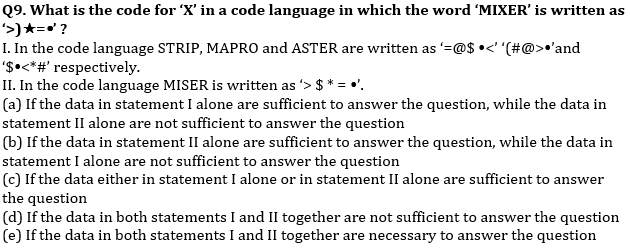
Q10. Six persons A, B, C, D, E and F are sitting in a row facing to the north direction. Who sits between C and E?
(I) A sit second from the left end. C sits third to the left of B, who is near to E.
(II) B is not an immediate neighbor of F, who does not sits any extreme end of the row.
(III) E is not the neighbor of A.
(a) If the data in statement I alone or in the statement II alone or in the statement III alone is sufficient to answer the question.
(b) If the data in statement I and II are sufficient to answer the question, while the data in statement III are not sufficient to answer the question.
(c) If the data in statement I and III are sufficient to answer the question, while the data in statement II is not sufficient to answer the question.
(d) If the data in statement II and III are sufficient to answer the question, while the data in statement I is not sufficient to answer the question.
(e) If the data in all the statement I, II and III are necessary to answer the question.
Q11. There are six buildings in a colony i.e. A, B, C, D, E, F. Building A is 1500m north of building B. Building D is exactly between building A&B. Building F is 1km east of building D and 500m north of building C. Building E is 0.6km far from building A. Find in which direction Building E with respect to building C, and also find the distance between building D to building E?
(a) North-West, Can’t be determined
(b) South-West, 400m
(c) North-East, 1.6km
(d) None-of-these, 150m
(e) North-West, 0.15km
Directions (12): Study the following information carefully and answer the given questions:
A person faces in the north direction at point X. He started his journey from point X and walks 5km after taking a right turn, after that he walks 10km to his left and turns 135°clockwise direction then walks 12km. Finally, he turns 45° anticlockwise and walks 5km to reach at point Y.
Q12. What is the direction of point Y with respect to 3rd turn of the person?
(a) North-West
(b) North
(c) South- East
(d) Can’t be determine
(e) None of these
Q13. Study the following information carefully and answer the given questions:
A person starts walking 10km in his left and reached at point A, after that he turns 45° anticlockwise and walks 15km. At last he turns 135° clockwise and walks 12km and reached at point B. Find the distance between point A and point B, a straight line is formed when we joint point A and B?
(a) 5km
(b) 8km
(c) 9km
(d) Can’t be determine
(e) None of these
Directions (14-15): In each question below is given a statement followed by three assumptions numbered I, II and III. As assumption is something supposed to be taken for granted. You have to consider the statement and the assumptions and decide which of the assumptions implicit in the statement. Then decide which of the answers (a), (b), (c), (d) and (e) is the correct answer.
Q14. Statement: “You should be very careful so that the society does not adversely comment on the police leadership”. – A statement made by a CBI officer to the newly recruited young officers.
Assumptions:
(I)The society always indulge in adverse comments.
(II)People’s trust in the police force is not up to the desired level.
(III)Society has the efficiency to judge accurately about the police leadership.
(a) I and II
(b) II and III
(c) I and III
(d) All of these
(e) None of these
Q15. Statements: The High Court has ordered state X to submit the case papers of the hit-and-run accident involving actor Mr. Y and directed the police not to allow the actor or his family members and friends to meet witnesses or victims.
Assumptions:
(I)The kith and kin of an accused are likely to make an effort to tamper with the evidence or create a nuisance to help acquit the accused.
(II)The capacity of the wrongdoer cannot be a yardstick for deciding punishment for a crime.
(III)The court’s immediate concern is the grievance of the victims which needs redressal.
(a) Only I
(b) I and II
(c) I and III
(d) All of these
(e) None of these
Practice More Questions of Reasoning for Competitive Exams:
Solutions
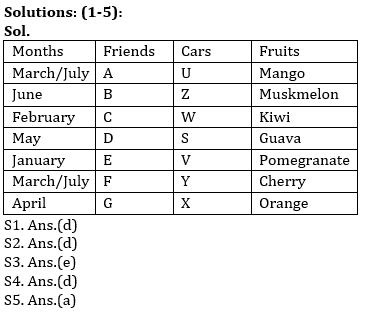
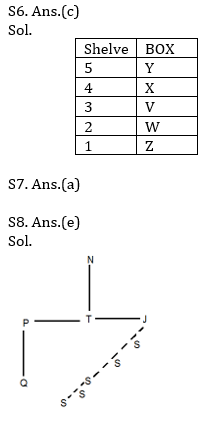

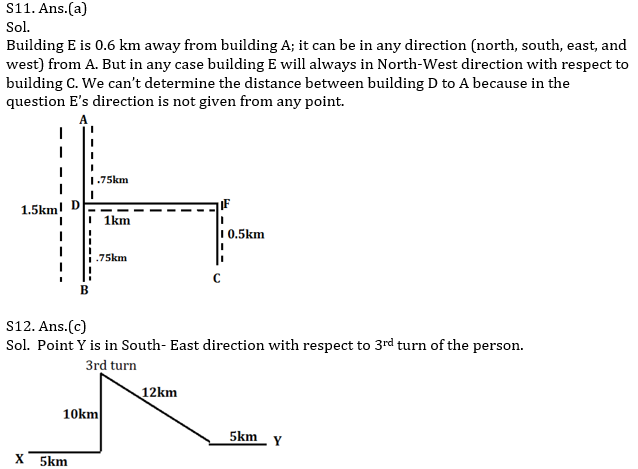
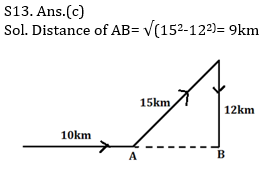
S14. Ans.(e)
Suggestion or direction to young officers by the officer is aimed at making the new recruits aware of their responsibilities. Assumption I can’t be co related with the above statement. Assumption II is an assumption; this is what leads to adverse comments. Assumption III is not implicit.
S15. Ans.(a) Only assumption I is implicit. III is not implicit because the reason behind this decision is that the witnesses or victims can’t be felt any problem regarding the case. They can be pressurized by the accused to change their witnesses. The decision is not given because of the court’s immediate concern for the victims.
Practice with Online Test Series for Bank Mains 2021:
Click Here to Register for Bank Exams 2020 Preparation Material

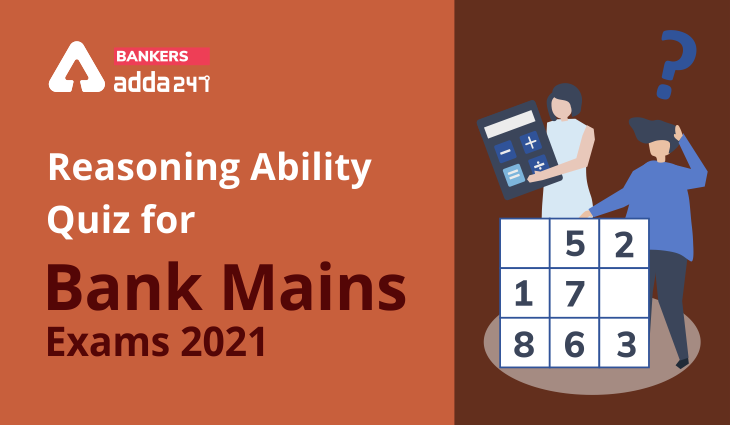


 GA Capsule for SBI Clerk Mains 2025, Dow...
GA Capsule for SBI Clerk Mains 2025, Dow...
 The Hindu Review October 2022: Download ...
The Hindu Review October 2022: Download ...
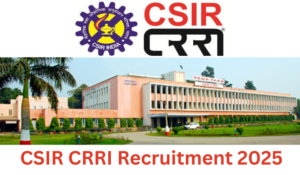 Delhi CSIR CRRI Recruitment 2025 Notific...
Delhi CSIR CRRI Recruitment 2025 Notific...







